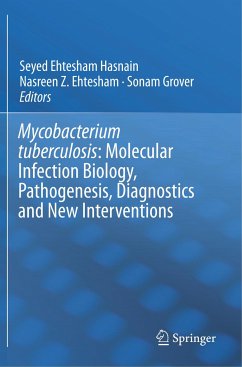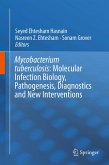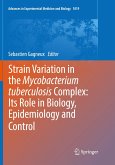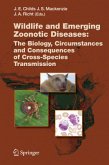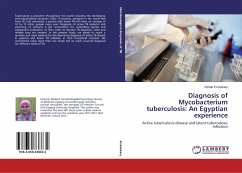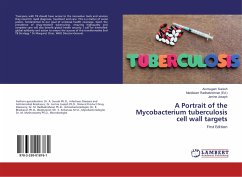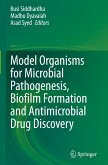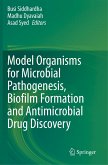Mycobacterium Tuberculosis: Molecular Infection Biology, Pathogenesis, Diagnostics and New Interventions
Herausgegeben:Hasnain, Seyed Ehtesham; Ehtesham, Nasreen Z.; Grover, Sonam
Mycobacterium Tuberculosis: Molecular Infection Biology, Pathogenesis, Diagnostics and New Interventions
Herausgegeben:Hasnain, Seyed Ehtesham; Ehtesham, Nasreen Z.; Grover, Sonam
- Broschiertes Buch
- Merkliste
- Auf die Merkliste
- Bewerten Bewerten
- Teilen
- Produkt teilen
- Produkterinnerung
- Produkterinnerung
This book reviews recent advances in the molecular and infection biology, pathology, and molecular epidemiology of Mycobacterium tuberculosis, as well as the identification and validation of novel molecular drug targets for the treatment of this mycobacterial disease. Despite being completely curable, tuberculosis is still one of the leading global causes of death. M. tuberculosis, the causative organism - one of the smartest pathogens known - adopts highly intelligent strategies for survival and pathogenesis.
Presenting a wealth of information on the molecular infection biology of M.…mehr
Andere Kunden interessierten sich auch für
![Mycobacterium Tuberculosis: Molecular Infection Biology, Pathogenesis, Diagnostics and New Interventions Mycobacterium Tuberculosis: Molecular Infection Biology, Pathogenesis, Diagnostics and New Interventions]() Mycobacterium Tuberculosis: Molecular Infection Biology, Pathogenesis, Diagnostics and New Interventions117,99 €
Mycobacterium Tuberculosis: Molecular Infection Biology, Pathogenesis, Diagnostics and New Interventions117,99 €![Strain Variation in the Mycobacterium tuberculosis Complex: Its Role in Biology, Epidemiology and Control Strain Variation in the Mycobacterium tuberculosis Complex: Its Role in Biology, Epidemiology and Control]() Strain Variation in the Mycobacterium tuberculosis Complex: Its Role in Biology, Epidemiology and Control139,99 €
Strain Variation in the Mycobacterium tuberculosis Complex: Its Role in Biology, Epidemiology and Control139,99 €![Wildlife and Emerging Zoonotic Diseases: The Biology, Circumstances and Consequences of Cross-Species Transmission Wildlife and Emerging Zoonotic Diseases: The Biology, Circumstances and Consequences of Cross-Species Transmission]() Wildlife and Emerging Zoonotic Diseases: The Biology, Circumstances and Consequences of Cross-Species Transmission154,99 €
Wildlife and Emerging Zoonotic Diseases: The Biology, Circumstances and Consequences of Cross-Species Transmission154,99 €![Diagnosis of Mycobacterium tuberculosis: An Egyptian experience Diagnosis of Mycobacterium tuberculosis: An Egyptian experience]() Rehab El-SokkaryDiagnosis of Mycobacterium tuberculosis: An Egyptian experience49,99 €
Rehab El-SokkaryDiagnosis of Mycobacterium tuberculosis: An Egyptian experience49,99 €![A Portrait of the Mycobacterium tuberculosis cell wall targets A Portrait of the Mycobacterium tuberculosis cell wall targets]() Arumugam SureshA Portrait of the Mycobacterium tuberculosis cell wall targets25,99 €
Arumugam SureshA Portrait of the Mycobacterium tuberculosis cell wall targets25,99 €![Model Organisms for Microbial Pathogenesis, Biofilm Formation and Antimicrobial Drug Discovery Model Organisms for Microbial Pathogenesis, Biofilm Formation and Antimicrobial Drug Discovery]() Model Organisms for Microbial Pathogenesis, Biofilm Formation and Antimicrobial Drug Discovery155,99 €
Model Organisms for Microbial Pathogenesis, Biofilm Formation and Antimicrobial Drug Discovery155,99 €![Model Organisms for Microbial Pathogenesis, Biofilm Formation and Antimicrobial Drug Discovery Model Organisms for Microbial Pathogenesis, Biofilm Formation and Antimicrobial Drug Discovery]() Model Organisms for Microbial Pathogenesis, Biofilm Formation and Antimicrobial Drug Discovery154,99 €
Model Organisms for Microbial Pathogenesis, Biofilm Formation and Antimicrobial Drug Discovery154,99 €-
-
-
This book reviews recent advances in the molecular and infection biology, pathology, and molecular epidemiology of Mycobacterium tuberculosis, as well as the identification and validation of novel molecular drug targets for the treatment of this mycobacterial disease.
Despite being completely curable, tuberculosis is still one of the leading global causes of death. M. tuberculosis, the causative organism - one of the smartest pathogens known - adopts highly intelligent strategies for survival and pathogenesis.
Presenting a wealth of information on the molecular infection biology of M. tuberculosis, as well as nontuberculous mycobacteria (NTM), the book provides an overview of the functional role of the PE/PPE group of proteins, which is exclusive to the genus Mycobacteria, of host-pathogen interactions, and virulence. It also explores the pathogenesis of the infection, pathology, epidemiology, and diagnosis of NTM. Finally it discusses current and novel approaches in vaccine development against tuberculosis, including the role of nanotechnology.
With state-of-the-art contributions from experts in the respective domains, this book is an informative resource for practitioners as well as medical postgraduate students and researchers.
Despite being completely curable, tuberculosis is still one of the leading global causes of death. M. tuberculosis, the causative organism - one of the smartest pathogens known - adopts highly intelligent strategies for survival and pathogenesis.
Presenting a wealth of information on the molecular infection biology of M. tuberculosis, as well as nontuberculous mycobacteria (NTM), the book provides an overview of the functional role of the PE/PPE group of proteins, which is exclusive to the genus Mycobacteria, of host-pathogen interactions, and virulence. It also explores the pathogenesis of the infection, pathology, epidemiology, and diagnosis of NTM. Finally it discusses current and novel approaches in vaccine development against tuberculosis, including the role of nanotechnology.
With state-of-the-art contributions from experts in the respective domains, this book is an informative resource for practitioners as well as medical postgraduate students and researchers.
Produktdetails
- Produktdetails
- Verlag: Springer / Springer Nature Singapore / Springer, Berlin
- Artikelnr. des Verlages: 978-981-32-9415-8
- 1st edition 2019
- Seitenzahl: 540
- Erscheinungstermin: 27. Dezember 2020
- Englisch
- Abmessung: 235mm x 155mm x 28mm
- Gewicht: 922g
- ISBN-13: 9789813294158
- ISBN-10: 9813294159
- Artikelnr.: 60577182
- Herstellerkennzeichnung Die Herstellerinformationen sind derzeit nicht verfügbar.
- Verlag: Springer / Springer Nature Singapore / Springer, Berlin
- Artikelnr. des Verlages: 978-981-32-9415-8
- 1st edition 2019
- Seitenzahl: 540
- Erscheinungstermin: 27. Dezember 2020
- Englisch
- Abmessung: 235mm x 155mm x 28mm
- Gewicht: 922g
- ISBN-13: 9789813294158
- ISBN-10: 9813294159
- Artikelnr.: 60577182
- Herstellerkennzeichnung Die Herstellerinformationen sind derzeit nicht verfügbar.
Prof Seyed E. Hasnain has contributed significantly to tuberculosis research focusing on infection biology and functional epidemiology. He has received numerous recognitions and honors including, Robert Koch Fellow, Berlin; Fellow, American Academy of Microbiology (USA); Member, German National Academy of Sciences-Leopoldina; Fellow, TWAS (Italy), and Fellow of all the major Indian Science Academies (FNA/FASc/FNASc). He also received the Alexander von Humboldt Research Award (Germany), Shanti Swarup Bhatnagar Prize, GD Birla Award, JC Bose Fellowship and many others. A former member of the Science Advisory Council to the Prime Minister of India for 2 terms (2004-2014), Hasnain was the first Director of the Centre for DNA Fingerprinting and Diagnostics, Hyderabad and later Vice-Chancellor of the prestigious University of Hyderabad (2005-2011) and served as invited Professor, IIT-Delhi (2011-2019). Currently, he is the Vice-Chancellor of Jamia Hamdard and alsoProfessor, JH-Institute of Molecular Medicine, where he leads a very large, active and generously funded TB research group. Dr. Nasreen Zafar Ehtesham received her Master's from Aligarh Muslim University, Aligarh and graduate training from the University of Alberta, Edmonton, Canada. She pursued her Ph.D. at the National Institute of Immunology, New Delhi (1991) and joined the ICGEB as a Rockefeller Postdoc Fellow. She was appointed as Deputy Director, National Institute of Nutrition, Hyderabad where her group focused on nutrition and inflammation biology. She established the link between pathogenesis, inflammation and stress response using the Mycobacterium tuberculosis infection model. An elected Fellow of the National Academy of Sciences, she has served as a member of several decision-making bodies of the Health Ministry, S&T Ministry. She is the recipient of many awards, including the ICMR-Kshanika Oration Award for her contributionsto tuberculosis biology. She has published over 70 research papers in prestigious journals such as PNAS and serves on the editorial boards of a number of journals. Currently, she is Director-in-Charge of the ICMR National Institute of Pathology, New Delhi. Dr. Sonam Grover is a UGC-Assistant Professor at JH-Institute of Molecular Medicine, Jamia Hamdard, New Delhi. She completed her Ph.D. at JNU (2014) and joined Kusuma School of Biological Sciences, IIT Delhi as a Postdoctoral Fellow the same year. During this tenure, she received a Women Scientist Grant from the Department of Health Research, Govt of India. Her main areas of research include Mycobacterium tuberculosis host-pathogen interactions, drug repurposing and identifying novel drug targets against tuberculosis. She has published over 25 research papers in various international, peer-reviewed journals including mBio and Molecular Neurobiology. She has deliveredtalks and presented her work at several national and international conferences and symposia. She is PI/CoPI in research projects funded by agencies such as DBT and DHR. She was also awarded the prestigious 'ASCB Travel Award for graduate students' to present her research at international conferences.
Chapter 1. Challenges and Advances in TB drug discovery.- Chapter 2. Biofilms: A Phenotypic mechanism of bacteria conferring tolerance against stress and antibiotics.- Chapter 3. History of TB- Robert Koch and Beyond.- Chapter 4. Clinical Aspects and Principles of Management of Tuberculosis.- Chapter 5. Toxin-Antitoxin (TA) systems in stress survival and pathogenesis.- Chapter 6. Infections with Nontuberculous Mycobacteria: Increased awareness and recent developments.- Chapter 7. Heat Shock Proteins in the Pathogenesis of Mycobacterium tuberculosis.- Chapter 8. Tuberculosis vaccine: past experiences and future prospects.- Chapter 9. TB Diagnostics: Journey from Smear Microscopy to Whole Genome Sequencing.- Chapter 10. Nucleotide excision repair pathway in mycobacteria.- Chapter 11. Intrinsically disordered regions in PE/PPE protein family of Mycobacterium tuberculosis: Moonlighting function.- Chapter 12. Best Practices in Mycobacterial Research Laboratories.- Chapter 13. Cellular stress responses and immunological regulations during Mycobacterium tuberculosis infection.- Chapter 14. Repurposing of Carbapenems for the treatment of Drug-Resistant Tuberculosis.- Chapter 15. Mesenchymal stem cells: A hidden arsenal for Mtb persistence, resuscitation and reactivation.- Chapter 16. Importance of cell wall-associated Poly- -L-glutamine in the biology of pathogenic mycobacteria.- Chapter 17. Breaking the transmission of TB: a roadmap to bridge the gaps in controlling TB in endemic settings.- Chapter 18. Mycobacterial Methyltransferases: Significance in Pathogenesis and Virulence.- Chapter 19. Tuberculosis as an underlying etiological factor for other human respiratory diseases.- Chapter 20. Tuberculosis in New Zealand: Historical Overview to Modern Epidemiology.- Chapter 21. The PE and PPE family proteins of Mycobacterium tuberculosis: What they are upto?.- Chapter 22. Endoplasmic Reticulum stress: Importance in Pathogenesis of Mycobacterium tuberculosis.- Chapter 23. Comparative in silico analyses reveal crucial factors for virulence, antigenicity and evolution in M.tb.- Chapter 24. Host Factors in Tuberculosis.- Chapter 25. Extrapulmonary Tuberculosis.- Chapter 26. Immunotherapeutic potential of Mycobacterium indicus pranii against tuberculosis.
Chapter 1. Challenges and Advances in TB drug discovery.- Chapter 2. Biofilms: A Phenotypic mechanism of bacteria conferring tolerance against stress and antibiotics.- Chapter 3. History of TB- Robert Koch and Beyond.- Chapter 4. Clinical Aspects and Principles of Management of Tuberculosis.- Chapter 5. Toxin-Antitoxin (TA) systems in stress survival and pathogenesis.- Chapter 6. Infections with Nontuberculous Mycobacteria: Increased awareness and recent developments.- Chapter 7. Heat Shock Proteins in the Pathogenesis of Mycobacterium tuberculosis.- Chapter 8. Tuberculosis vaccine: past experiences and future prospects.- Chapter 9. TB Diagnostics: Journey from Smear Microscopy to Whole Genome Sequencing.- Chapter 10. Nucleotide excision repair pathway in mycobacteria.- Chapter 11. Intrinsically disordered regions in PE/PPE protein family of Mycobacterium tuberculosis: Moonlighting function.- Chapter 12. Best Practices in Mycobacterial Research Laboratories.- Chapter 13. Cellular stress responses and immunological regulations during Mycobacterium tuberculosis infection.- Chapter 14. Repurposing of Carbapenems for the treatment of Drug-Resistant Tuberculosis.- Chapter 15. Mesenchymal stem cells: A hidden arsenal for Mtb persistence, resuscitation and reactivation.- Chapter 16. Importance of cell wall-associated Poly- -L-glutamine in the biology of pathogenic mycobacteria.- Chapter 17. Breaking the transmission of TB: a roadmap to bridge the gaps in controlling TB in endemic settings.- Chapter 18. Mycobacterial Methyltransferases: Significance in Pathogenesis and Virulence.- Chapter 19. Tuberculosis as an underlying etiological factor for other human respiratory diseases.- Chapter 20. Tuberculosis in New Zealand: Historical Overview to Modern Epidemiology.- Chapter 21. The PE and PPE family proteins of Mycobacterium tuberculosis: What they are upto?.- Chapter 22. Endoplasmic Reticulum stress: Importance in Pathogenesis of Mycobacterium tuberculosis.- Chapter 23. Comparative in silico analyses reveal crucial factors for virulence, antigenicity and evolution in M.tb.- Chapter 24. Host Factors in Tuberculosis.- Chapter 25. Extrapulmonary Tuberculosis.- Chapter 26. Immunotherapeutic potential of Mycobacterium indicus pranii against tuberculosis.

